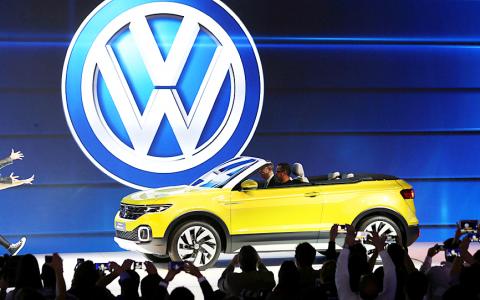Volkswagen AG (VW) has reached an agreement with US regulators for a mix of buybacks and fixes for 80,000 polluting Audi, Porsche and VW 3-liter vehicles, two sources briefed on the matter said on Tuesday.
The agreement includes a buyback offer for about 20,000 older Audi and VW sport utility vehicles (SUVs) and a software fix for 60,000 newer Porsche, Audi and VW cars and SUVs, the sources said.
A separate, more complex fix is expected to be offered for the older vehicles. Talks are ongoing between lawyers for the owners and VW over compensation for the owners ahead of a Nov. 30 court hearing.

Photo: Reuters
The agreement is a major step toward VW resolving its outstanding diesel emission issues in the US — after it reached a separate US$10.03 billion buyback offer for 475,000 2-liter vehicles in June.
VW has already agreed to spend up to US$16.5 billion to resolve US diesel emissions cheating allegations, including the 2-liter buyback offer.
Audi said it is still working closely with regulators “to reach an agreement on an approved resolution” ahead of a Nov. 30 court hearing, but declined to comment on confidential talks.
Lead attorney for the owners Elizabeth Cabraser said in a statement that any agreement between owners and the company should offer all 3-liter owners a choice between a buyback or a fix if approved by regulators.
The US Environmental Protection Agency (EPA) declined to comment yesterday.
“While an agreement between the EPA and Volkswagen may address some of the environmental damage, it does not hold the company accountable for the harm caused to consumers. We will continue to pursue a fair resolution on their behalf,” Cabraser said.
Details of a final settlement are still being worked out, but VW is expected to save potentially billions by avoiding a buyback of all 3-liter vehicles.
VW is also expected to face billions in fines as part of a separate potential settlement with the US Department of Justice to resolve an ongoing criminal investigation and a civil suit alleging civil violations of the US Clean Air Act. The firm also faces legal action by at least 19 US states.
The 475,000 2-liter diesel vehicles have software that allowed them to evade emissions rules in testing and emit up to 40 times legally allowable emissions in onroad driving. The 3-liter vehicles have an undeclared auxiliary emissions system that allowed the vehicles to emit up to nine times allowable limits.
Court documents show that at least 60 percent of those owners have already signaled they plan to sell the vehicles back.
The 2-liter buyback offer includes compensation of US$5,100 to US$10,000 per vehicle beyond the vehicle’s value. VW wants to offer significantly less compensation to 3-liter owners, the sources said.
Audi has also come under scrutiny over whether some gasoline vehicles have separate software that lowered carbon dioxide emissions by detecting whether a car’s steering wheel was turned as it would be when driving on a road.
VW has been barred from selling diesel vehicles in the US since last year and has said it has not decided whether it will resume US diesel sales.

Taiwanese suppliers to Taiwan Semiconductor Manufacturing Co. (TSMC, 台積電) are expected to follow the contract chipmaker’s step to invest in the US, but their relocation may be seven to eight years away, Minister of Economic Affairs J.W. Kuo (郭智輝) said yesterday. When asked by opposition Chinese Nationalist Party (KMT) Legislator Niu Hsu-ting (牛煦庭) in the legislature about growing concerns that TSMC’s huge investments in the US will prompt its suppliers to follow suit, Kuo said based on the chipmaker’s current limited production volume, it is unlikely to lead its supply chain to go there for now. “Unless TSMC completes its planned six

Power supply and electronic components maker Delta Electronics Inc (台達電) yesterday said second-quarter revenue is expected to surpass the first quarter, which rose 30 percent year-on-year to NT$118.92 billion (US$3.71 billion). Revenue this quarter is likely to grow, as US clients have front-loaded orders ahead of US President Donald Trump’s planned tariffs on Taiwanese goods, Delta chairman Ping Cheng (鄭平) said at an earnings conference in Taipei, referring to the 90-day pause in tariff implementation Trump announced on April 9. While situations in the third and fourth quarters remain unclear, “We will not halt our long-term deployments and do not plan to

‘SHORT TERM’: The local currency would likely remain strong in the near term, driven by anticipated US trade pressure, capital inflows and expectations of a US Fed rate cut The US dollar is expected to fall below NT$30 in the near term, as traders anticipate increased pressure from Washington for Taiwan to allow the New Taiwan dollar to appreciate, Cathay United Bank (國泰世華銀行) chief economist Lin Chi-chao (林啟超) said. Following a sharp drop in the greenback against the NT dollar on Friday, Lin told the Central News Agency that the local currency is likely to remain strong in the short term, driven in part by market psychology surrounding anticipated US policy pressure. On Friday, the US dollar fell NT$0.953, or 3.07 percent, closing at NT$31.064 — its lowest level since Jan.

The New Taiwan dollar and Taiwanese stocks surged on signs that trade tensions between the world’s top two economies might start easing and as US tech earnings boosted the outlook of the nation’s semiconductor exports. The NT dollar strengthened as much as 3.8 percent versus the US dollar to 30.815, the biggest intraday gain since January 2011, closing at NT$31.064. The benchmark TAIEX jumped 2.73 percent to outperform the region’s equity gauges. Outlook for global trade improved after China said it is assessing possible trade talks with the US, providing a boost for the nation’s currency and shares. As the NT dollar